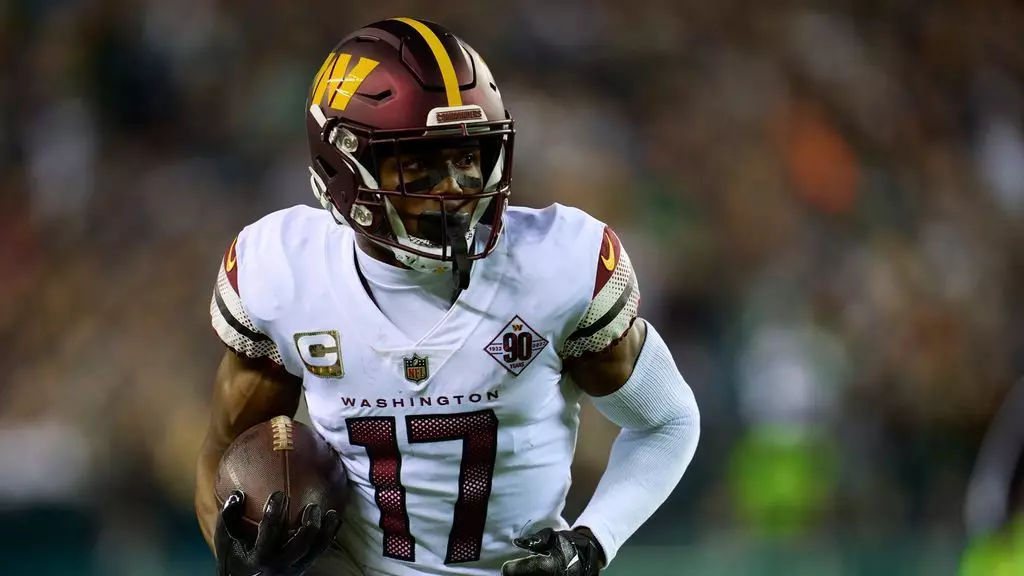In the midst of NFL’s relentless commercial machine, the ongoing saga surrounding Washington Commanders wide receiver Terry McLaurin highlights a troubling reality: the sport’s obsession with profit over player loyalty and stability. McLaurin’s recent trade request isn’t just a minor blip but a symptom of a deeper systemic issue within professional football — the commodification of talent. His plea to move on is portrayed as “normal business,” yet beneath this sanitized language lies a burnout of player trust and respect—transforming team dynamics into transactional exchanges rather than collaborative growth.
This transactional mindset, once dismissed as simply part of the game, is now endemic. Coach Dan Quinn describes McLaurin’s movement as part of “normal business,” attempting to downplay the tension. But his words obscure the raw reality: a star player, who has consistently demonstrated loyalty and excellence, feels undervalued and treated as dollar signs instead of a vital team asset. By trivializing McLaurin’s concerns, the franchise diminishes his worth to mere negotiations, risking an eroding of morale and bond within the locker room. If the foundation of a team is built on mutual respect and shared goals, then McLaurin’s trade request points to a fundamental crack—one that could weaken Washington’s competitive spirit in the long run.
Neglecting Player Wellbeing in Pursuit of Profit
The NFL has long struggled to strike a balance between financial interests and honoring the contributions of its athletes. McLaurin’s case exemplifies how money-driven decisions threaten to overshadow player health and career longevity. His desire for a fair contract, comparable to peers like DK Metcalf, who recently signed for $32.5 million annually, underscores a broader issue: aging athletes are often undervalued just as they approach their prime years. McLaurin, expected to turn 30 shortly after his current deal concludes, is being seen not for his undeniable on-field productivity but through the lens of immediate financial calculus.
This shortsighted valuation neglects the human element. McLaurin’s performance, reflected in consecutive 1,000-yard seasons and Pro Bowl appearances, illustrates his elite status, yet the team’s reluctance to meet his fair market value exposes a double standard. The league’s focus on “cost control” can lead to a kind of talent attrition—players pushed into the twilight of their careers prematurely or devalued because their peak extends beyond the standard contractual ladder. This approach fuels feelings of alienation and mistrust—especially evident after McLaurin’s reported hold-in during training camp and his current ankle injury management.
The higher stakes here aren’t just about one player’s dissatisfaction; they threaten the integrity of the team’s cohesion, trust, and long-term viability. A franchise cannot afford to treat star players as commodities, especially in an era where player activism and demands for respect resonate loudly amongst the league’s fanbase and broader society. The NFL’s economic strategy should evolve to prioritize sustainable athlete relations—not just immediate profits.
Leadership’s Complicity and the Erosion of Core Values
From a leadership perspective, the handling of McLaurin’s situation exposes a troubling attitude: a silent acceptance of contractual disputes as inevitable. Coach Quinn’s attempt to dismiss concerns as “normal business” minimizes the human impact on players. His statement reveals a troubling detachment—treating the issue as a routine negotiation, rather than an urgent crisis of trust and respect. Such dismissiveness signals a disturbing indifference that can ripple through the organization, ultimately alienating players and undermining team unity.
The decision-makers’ reliance on jargon—suggesting they “leave negotiations to the GM,” or that they avoid judging financial matters—prevents genuine dialogue and fosters a culture of detachment. Instead of focusing on building an environment where players are valued beyond their dollar value, the leadership appears content to see talent as interchangeable parts. This is a detrimental mindset in a sport where emotional investment and team spirit are vital.
Furthermore, this situation shines a spotlight on the importance of economic fairness and the ethical responsibilities of franchises. McLaurin’s career accomplishments and consistent performance should be earning him a measure of security and respect—yet the franchise’s inching away from top-tier compensation reveals a corporate mentality increasingly devoid of empathy. It’s a stark reminder that in the NFL, monetary considerations often surpass moral imperatives, risking tarnishing the league’s reputation and the sport’s integrity.
The Broader Implications for NFL Culture and Society
This controversy isn’t isolated; it fuels questions about how professional sports value human beings. With players now more aware of their worth and rights, their demands for respect challenge the outdated notion of athletes merely as assets to exploit. McLaurin’s trade request is emblematic of a larger movement pushing for fair treatment and recognition of athletes’ rights—not just in contract negotiations but in the respect they deserve as individuals.
The NFL and its franchises have a moral obligation to rethink their priorities. Stars like McLaurin are essential not only for their on-field excellence but for inspiring fans and advocating for societal change. They embody resilience and dedication, qualities that should be rewarded with dignity rather than dismissed as “business as usual.” Ultimately, if the league seeks to sustain its popularity and legitimacy, it must acknowledge that players are more than commodities—they are the heart of the sport.
In a time when sport can serve as a catalyst for social progress, neglecting this reality risks alienating loyal fans and undervaluing the human stories behind the game. The fight for fair treatment in the NFL isn’t just about money; it’s about restoring decency, respect, and trust within a system that desperately needs reform.


Leave a Reply